人教版八年级上册Unit7 SectioA2d课件(共45张PPT,内嵌音频)
文档属性
| 名称 | 人教版八年级上册Unit7 SectioA2d课件(共45张PPT,内嵌音频) |
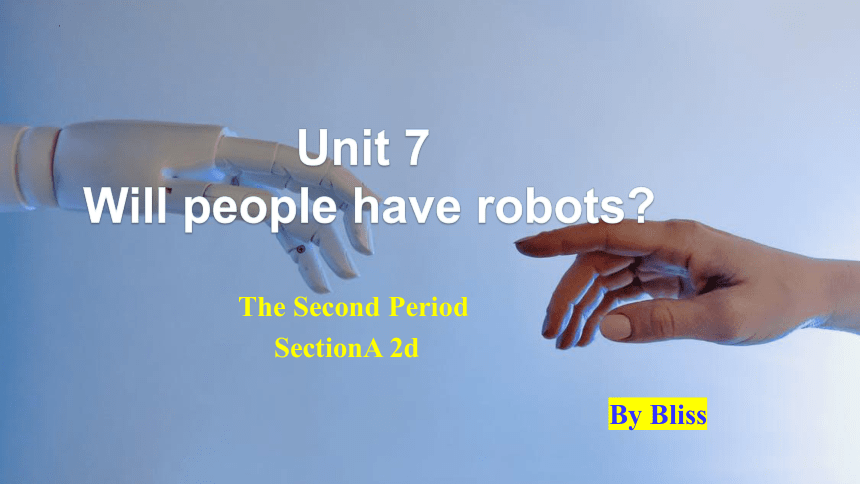
|
|
| 格式 | pptx | ||
| 文件大小 | 7.5MB | ||
| 资源类型 | 教案 | ||
| 版本资源 | 人教新目标(Go for it)版 | ||
| 科目 | 英语 | ||
| 更新时间 | 2023-06-03 00:00:00 | ||
图片预览

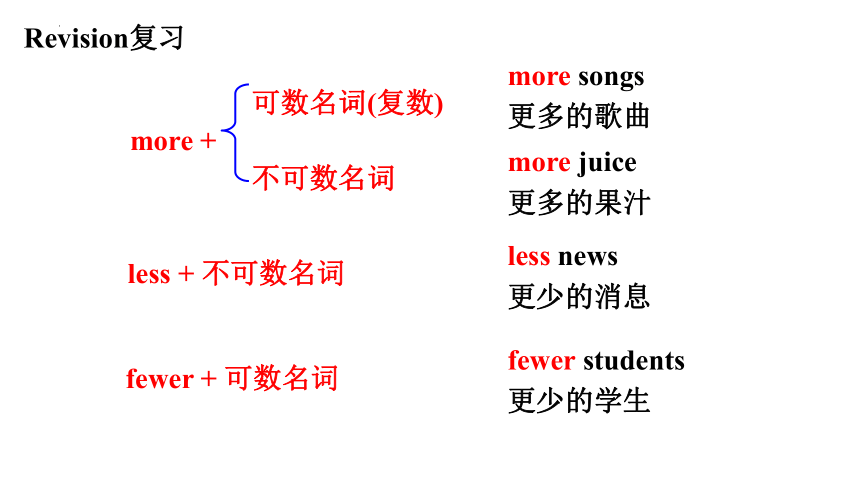
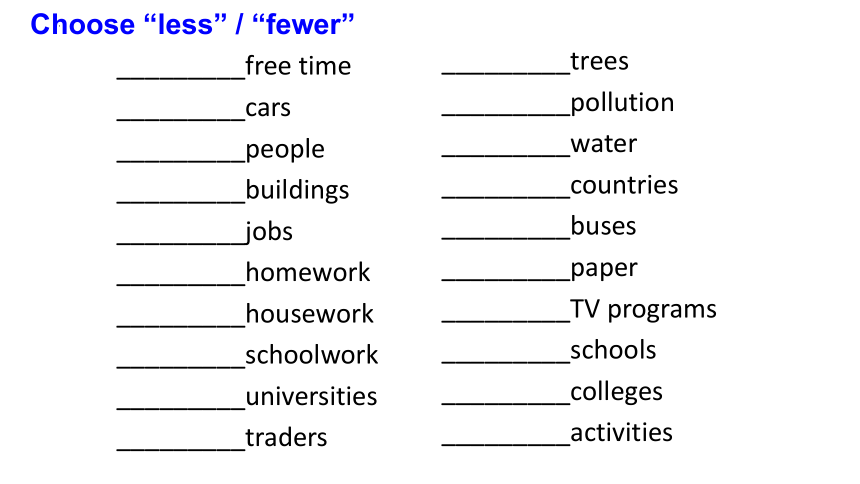
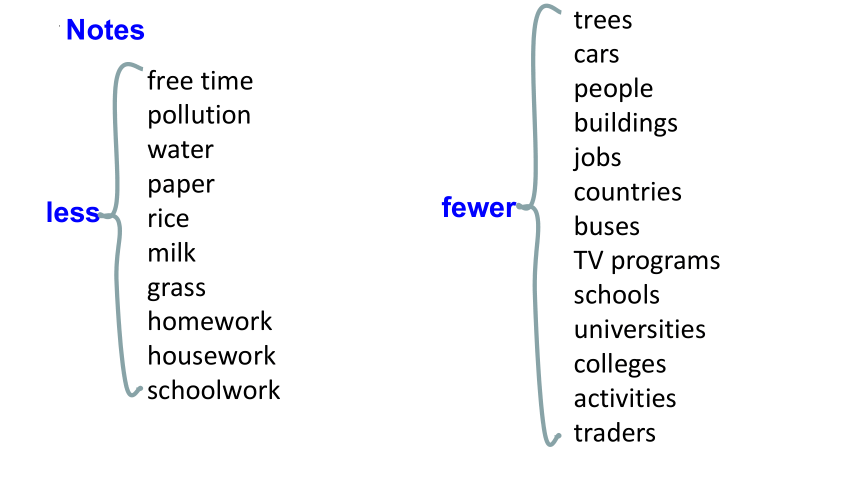
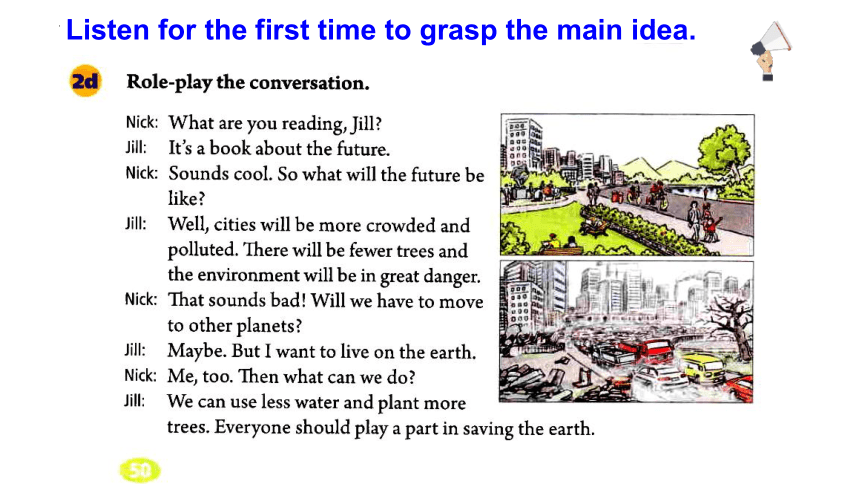
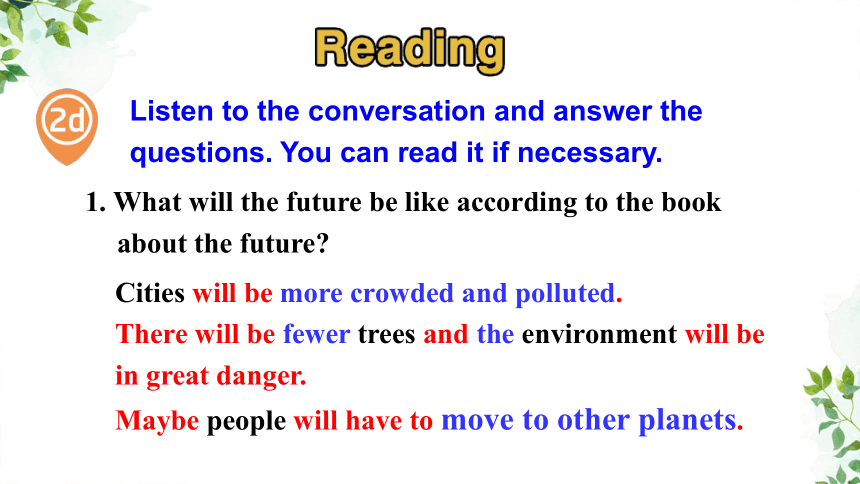

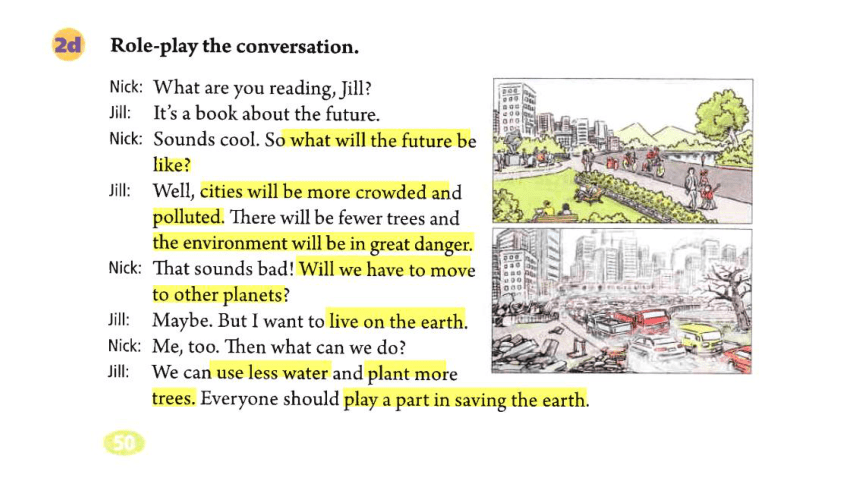
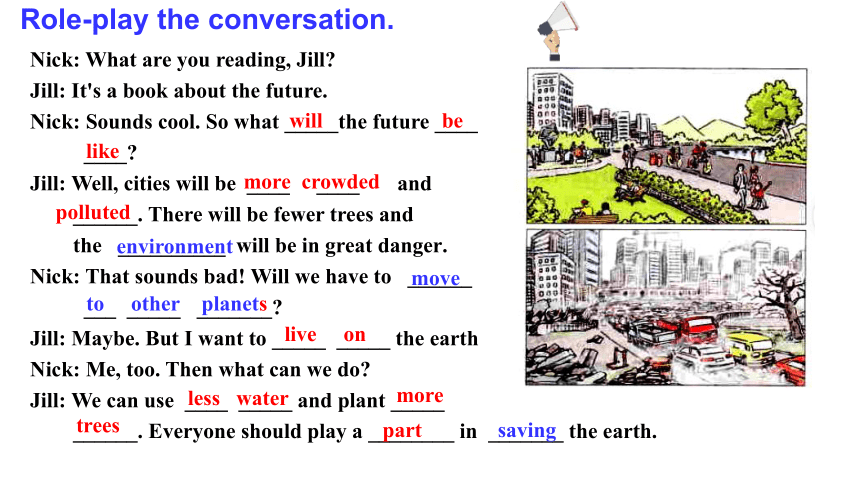
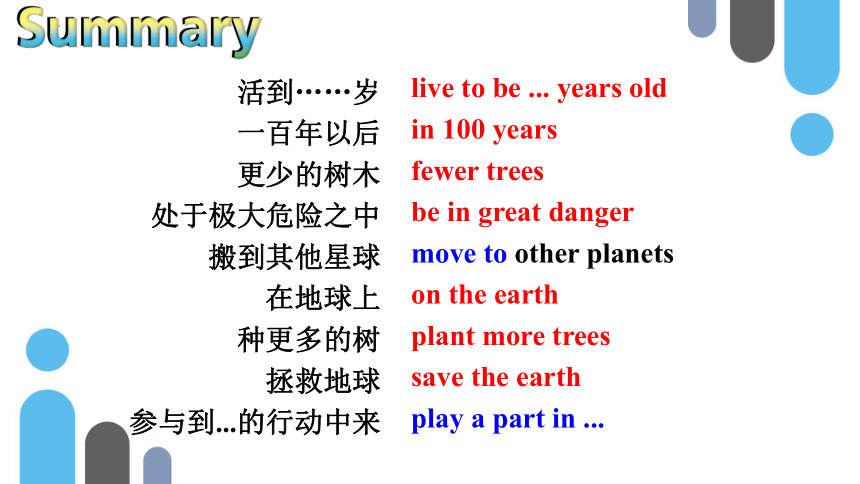
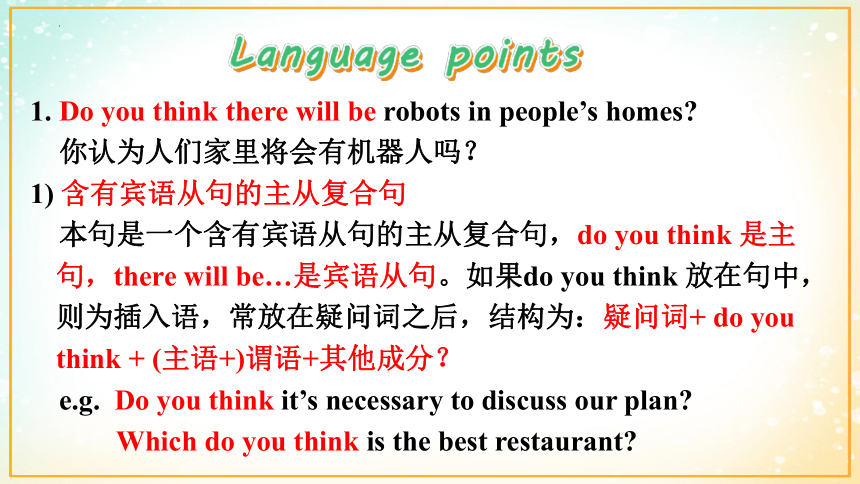
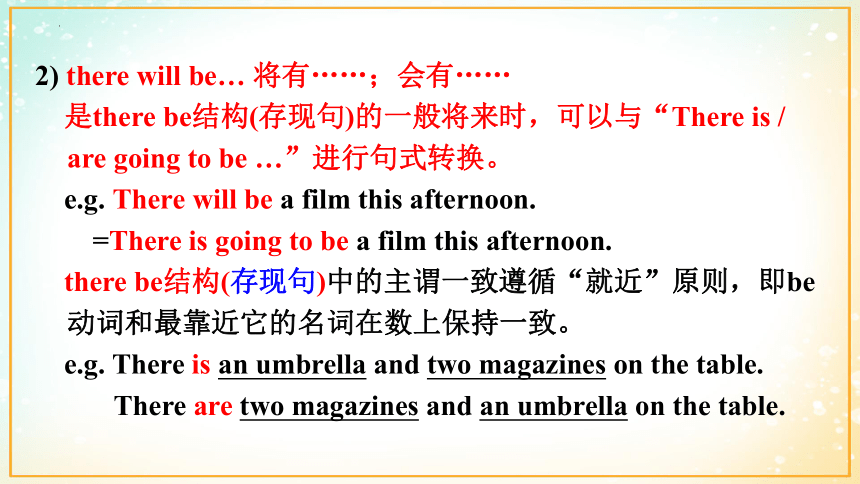
文档简介
(共45张PPT)
Unit 7
Will people have robots
By Bliss
The Second Period
SectionA 2d
可数名词(复数)
more +
不可数名词
less + 不可数名词
fewer + 可数名词
more juice
更多的果汁
more songs
更多的歌曲
less news
更少的消息
fewer students
更少的学生
Revision复习
Choose “less” / “fewer”
_________free time
_________cars
_________people
_________buildings
_________jobs
_________homework
_________housework
_________schoolwork
_________universities
_________traders
_________trees
_________pollution
_________water
_________countries
_________buses
_________paper
_________TV programs
_________schools
_________colleges
_________activities
Notes
free time
pollution
water
paper
rice
milk
grass
homework
housework
schoolwork
trees
cars
people
buildings
jobs
countries
buses
TV programs
schools
universities
colleges
activities
traders
less
fewer
Listen for the first time to grasp the main idea.
1. What will the future be like according to the book about the future
Listen to the conversation and answer the questions. You can read it if necessary.
Cities will be more crowded and polluted.
There will be fewer trees and the environment will be in great danger.
Maybe people will have to move to other planets.
2. What can people do to save the earth
We can use less water and plant more trees.
We should all play a part in saving the earth.
Role-play the conversation.
more crowded
more polluted
cities
plant more ...
Nick: What are you reading, Jill
Jill: It's a book about the future.
Nick: Sounds cool. So what _____the future ____
____
Jill: Well, cities will be ____ ____ and
______. There will be fewer trees and
the __________ will be in great danger.
Nick: That sounds bad! Will we have to ______
___ _____ _______
Jill: Maybe. But I want to _____ _____ the earth
Nick: Me, too. Then what can we do
Jill: We can use ____ _____ and plant _____
______. Everyone should play a ________ in _______ the earth.
Role-play the conversation.
will
be
like
more crowded
polluted
environment
move
to other planets
live on
less water
more
trees
part
saving
live to be ... years old
in 100 years
fewer trees
be in great danger
move to other planets
on the earth
plant more trees
save the earth
play a part in ...
活到……岁
一百年以后
更少的树木
处于极大危险之中
搬到其他星球
在地球上
种更多的树
拯救地球
参与到...的行动中来
1. Do you think there will be robots in people’s homes
你认为人们家里将会有机器人吗?
1) 含有宾语从句的主从复合句
本句是一个含有宾语从句的主从复合句,do you think 是主句,there will be…是宾语从句。如果do you think 放在句中,则为插入语,常放在疑问词之后,结构为:疑问词+ do you think + (主语+)谓语+其他成分?
e.g. Do you think it’s necessary to discuss our plan
Which do you think is the best restaurant
2) there will be… 将有……;会有……
是there be结构(存现句)的一般将来时,可以与“There is / are going to be …”进行句式转换。
e.g. There will be a film this afternoon.
=There is going to be a film this afternoon.
there be结构(存现句)中的主谓一致遵循“就近”原则,即be动词和最靠近它的名词在数上保持一致。
e.g. There is an umbrella and two magazines on the table.
There are two magazines and an umbrella on the table.
【语境应用】单项选择。
In the near future, there __________ self-driving cars in our city.
A. is B. was C. are D. will be
D
2. Will people use money in 100 years
100年以后人们还会使用钱吗?
in 100 years 在100年以后
in为介词,其后跟一段时间:在……之后,通常用于一般将来时。
e.g. I’ll finish eating breakfast in a few minutes.
I’ll come back in three days. 我3天后回来。
He came back after three days.
他三天后回来了。
②after还+时间点, 既可用于将来时也可用于过去时
He came back after two o'clock.
他两点后回来了。
He will come back after two o’clock.
他两点后会回来的。 = He’ll come back in ... hours.
思考:假如现在是9点,用in如何表达?
①“after +时间段”用于过去时,表示
从过去某个时间点算起一段时间后
in + 时间段 表示以现在为起点的将来某一段时间之后,通常用于一般将来时 用how soon提问
after+ 时间段 表示以过去时间为起点的一段时间以后,通常用于一般过去时 用when提问
中考单选/完形易错考点
e.g. —How soon will your mother finish cooking dinner
—In an hour.
—When did he receive her letter
—After five weeks.
【语境应用】单项选择。
—Shall we stop and wait for others
—Sounds good. I think they will catch up(赶上) ________ a few minutes.
A. during B. after C. for D. in
D
3. What’s your prediction about the future
你对未来有什么预测?
future n. 将来;未来
①in the future (在)将来;(在)未来
e.g. This may not happen in the future.
②in future = from now on 今后;从现在起
e.g. I asked her to be more careful in future.
Ⅰ. 根据句意及所给首字母提示,补全所缺单词。
1. Water is important to all living things on the e , so we should save water.
2. Riding a bike is good for health. It can also help reduce (减少) air p .
3. I need some p and a pen to write a letter (信).
4. Nobody knows what will happen in the f .
5. Each child wants to have a happy home e .
earth
pollution
paper
future
environment
Ⅱ. 根据汉语意思,完成英语句子,每空一词。
1. 他将在这台手术中发挥重要作用。
He will ________ ________ ________ ________ ________ this operation.
2. 我希望50年后世界和平。
I hope there will be world peace _______ _______ _______.
3. 她的爷爷奶奶都活到了九十多岁。
Both her grandpa and grandma _______ _______ _______ _______ _______ years old.
play an important part/role in
in 50/fifty years
lived to be
over 90/ninety
4. John开车如此快以至于我感到有生命危险。
John drove so fast that I felt my life was _______ _______.
5. 他们卖掉了房子,搬到了一个小点儿的房子。
They sold their house and _______ _______ a smaller one.
in danger
moved to
Unit 7
Will people have robots
By Bliss
The Third Period
Grammar
To learn to use will + do
To learn to use there will be
To be able to predict what a city in the future will be like with the words more, fewer, less.
peace n. 和平 (不可数名词)
peaceful adj. 和平的;安宁的
keep the peace 维持和平
in peace 静静地
build v. (built) 建筑;建造
e.g. The workers are building a bridge over the river.
n. 身材 (be) of medium build 中等身材
building n. 建筑物,房子
e.g. Tall buildings can be seen everywhere in the city.
sky n. 天空
sky的复数形式可用来描述天气或某处的天空状况
e.g. a land of blue skies and warm sunshine
拥有蔚蓝色天空和温暖阳光的土地
当只表示“天空”时,sky常用单数形式
in the sky 在天空中
e.g. There wasn't a cloud in the sky.
天空中晴朗无云。
1. 将来会是什么样子?
What ______ the future ______ ______
城市污染将会更多。且树木将会更少。
Cities _____ _____ ______ polluted. And there _____ _____ _____ _____.
will be more
will be like
will be fewer trees
Complete the following sentences.
2. 一百年后,人们会使用钱吗?
_____ people _____ money _____ 100 years
不会。一切东西将会免费。
No, they ______. Everything ____ ____ ____.
3. 世界将会和平吗?
_____ _____ _____ world peace
是的,我希望如此。
Yes, I _____ _____.
Will use in
won’t
will be
Will there be
free
hope so
n. 和平
4. 孩子们将会在家里的电脑上学习。
Kids _____ _____ at home ____ _________.
他们将不会去学校上学。
They ______ _____ ______ ________.
will study
on computers
won’t go to school
Try to find the rules
肯定句:
We will have robots in our homes in 100 years.
My uncle will come to Beijing next week.
They will study at home on computers in the future.
The environment will be in great danger.
否定句:
We won’t use money in 100 years.
Kids won’t go to school in the future.
一般疑问句:
-- Will people live to be 200 years old
-- Yes, they will.
-- Will they use money in 100 years
-- No, they won’t.
-- Will we have to move to other planets
-- Yes, maybe we will.
-- Will you go out tomorrow
-- No, I’ll not.
特殊疑问句:
-- What will the future be like
-- Cities will be more crowded and polluted.
-- What will your life be like in 10 years
-- I think I’ll be an astronaut.
-- Where will you live
-- I’ll live on a space station.
-- When will she leave for London
-- She’ll leave next Sunday.
用法:表示将来某个时间要发生的动作或存在的状态。
构成:助动词will + 动词原形
时间状语:in+时间段, tomorrow, in the future, next year…
否定句式: will + not + 动词原形
缩写: will --- ’ll will not --- won’t
一般将来时
一般疑问句式: Will + 主语 + 其他?
肯定回答:Yes, 主语 + will.
否定回答:No, 主语 + won’t.
主语为第一人称(I和we)时, 常用助动词shall。
肯定句: There + will + be + 其他.
否定句: There + won’t + be + 其他.
一般疑问句:Will + there + be +其他
答语: Yes, there will. / No, there won’t.
e.g. 将会有更多的人口。_______________________
将会有更少的树。 _______________________
将会有更多的污染。_________________________ 将会有更少的业余时间。________________________
There will be more people.
There will be fewer tress.
there be句型的一般将来时
There will be more pollution.
There will be less free time.
be going to结构表将来和一般将来时(will)
一般将来时(will) 常用来客观陈述将来某个时间要发生的动作或存在的状态。
be going to结构表示将要发生的动作或安排,特别是打算、计划、决定要做的事。
e.g. We are going to make the subway better.
I’m going to learn another foreign language next year.
My sister wants to be a school teacher. She’s going to study education.
Fill in the blanks with more, less or fewer.
1. In the future, there will be ____ fresh water because there will be _____ pollution in the sea.
2. In 100 years, there will be ______ cars because there will be ______ people in the cities.
3. There will be ______ jobs for people because ______ robots will do the same jobs as people.
more
less
more
more
淡水
more
fewer
n. 海; 海洋
4. I think there will be ______ cities because people will build ______ buildings in the country.
5. In 50 years, people will have ______ free time because there will be ______ things to do.
more
more
more
fewer (此题答案可互换)
v. 建造
1. Kids study at school now. In 100 years, __________________
____________________________________________________
they will study at home on computers.
Complete the predictions with what you think will happen.
2. I sometimes see blue skies in my city, but in the future, ____________________________________________________
I will almost see the blue skies every day.
sky n. 天空 P89
3. People now usually live to be about 70-80 years old, but in the future ______________________________________________
4. Families usually spend time together on weekends, but maybe in 200 years _________________________________________
people will live to be 100 years old.
families will spend time together every day.
Draw a picture of what you think a city in the future will be like. Then describe it to the class.
I think there will be more tall buildings, and there will be fewer cars and more buses.
Will there be more pollution
Will the air be cleaner
Will there be more animals in the zoo
Will our city become more crowded
Will more people drive their cars to work
Ⅰ. 根据语境及所给汉语提示,写出所缺内容。
1. ___________________________________(未来将有更少的学校) because children will study at home on computers.
2. We must be quick. ______________________ (几乎没有时间了).
3. I enjoy my life here. ______________________(我有几个好朋友) and we see each other quite often.
4. You need ________________________(多听少说).
There will be fewer schools in the future
There is little time
I have a few good friends
to listen more and talk less
5. __________________________(我不会告诉任何人). I promise.
6. —Goodbye! Have a nice holiday.
—Thanks. _________________________________________
(我会给你寄一张卡片) when I get there.
I won’t tell anyone / anybody
I will send you a card / I will send a card to you
1. —Tina wants to know if you _______ to the park with us tomorrow.
—I’d love to. But if it ________, I may go to the library instead. (2021辽宁鞍山)
A. go; will rain B. go; rains
C. will go; rains D. will go; will rain
C
2. —Is Helen here
—No, she isn't here. She _______ in half an hour.
(2021广西梧州)
A. arrives B. arrived C. will arrive D. has arrived
C
3. Mr. Green ______a new bike for his daughter tomorrow.
(2021吉林)
A. buys B. bought C. will buy
4. You can borrow this film—surely you ________ watching it. (2021河北)
enjoy B. enjoyed
C. will enjoy D. have enjoyed
C
C
写出几个对未来的预测,越多越好!
I think … in 100 years.
people
pollution
trees
cars
robots
future
Unit 7
Will people have robots
By Bliss
The Second Period
SectionA 2d
可数名词(复数)
more +
不可数名词
less + 不可数名词
fewer + 可数名词
more juice
更多的果汁
more songs
更多的歌曲
less news
更少的消息
fewer students
更少的学生
Revision复习
Choose “less” / “fewer”
_________free time
_________cars
_________people
_________buildings
_________jobs
_________homework
_________housework
_________schoolwork
_________universities
_________traders
_________trees
_________pollution
_________water
_________countries
_________buses
_________paper
_________TV programs
_________schools
_________colleges
_________activities
Notes
free time
pollution
water
paper
rice
milk
grass
homework
housework
schoolwork
trees
cars
people
buildings
jobs
countries
buses
TV programs
schools
universities
colleges
activities
traders
less
fewer
Listen for the first time to grasp the main idea.
1. What will the future be like according to the book about the future
Listen to the conversation and answer the questions. You can read it if necessary.
Cities will be more crowded and polluted.
There will be fewer trees and the environment will be in great danger.
Maybe people will have to move to other planets.
2. What can people do to save the earth
We can use less water and plant more trees.
We should all play a part in saving the earth.
Role-play the conversation.
more crowded
more polluted
cities
plant more ...
Nick: What are you reading, Jill
Jill: It's a book about the future.
Nick: Sounds cool. So what _____the future ____
____
Jill: Well, cities will be ____ ____ and
______. There will be fewer trees and
the __________ will be in great danger.
Nick: That sounds bad! Will we have to ______
___ _____ _______
Jill: Maybe. But I want to _____ _____ the earth
Nick: Me, too. Then what can we do
Jill: We can use ____ _____ and plant _____
______. Everyone should play a ________ in _______ the earth.
Role-play the conversation.
will
be
like
more crowded
polluted
environment
move
to other planets
live on
less water
more
trees
part
saving
live to be ... years old
in 100 years
fewer trees
be in great danger
move to other planets
on the earth
plant more trees
save the earth
play a part in ...
活到……岁
一百年以后
更少的树木
处于极大危险之中
搬到其他星球
在地球上
种更多的树
拯救地球
参与到...的行动中来
1. Do you think there will be robots in people’s homes
你认为人们家里将会有机器人吗?
1) 含有宾语从句的主从复合句
本句是一个含有宾语从句的主从复合句,do you think 是主句,there will be…是宾语从句。如果do you think 放在句中,则为插入语,常放在疑问词之后,结构为:疑问词+ do you think + (主语+)谓语+其他成分?
e.g. Do you think it’s necessary to discuss our plan
Which do you think is the best restaurant
2) there will be… 将有……;会有……
是there be结构(存现句)的一般将来时,可以与“There is / are going to be …”进行句式转换。
e.g. There will be a film this afternoon.
=There is going to be a film this afternoon.
there be结构(存现句)中的主谓一致遵循“就近”原则,即be动词和最靠近它的名词在数上保持一致。
e.g. There is an umbrella and two magazines on the table.
There are two magazines and an umbrella on the table.
【语境应用】单项选择。
In the near future, there __________ self-driving cars in our city.
A. is B. was C. are D. will be
D
2. Will people use money in 100 years
100年以后人们还会使用钱吗?
in 100 years 在100年以后
in为介词,其后跟一段时间:在……之后,通常用于一般将来时。
e.g. I’ll finish eating breakfast in a few minutes.
I’ll come back in three days. 我3天后回来。
He came back after three days.
他三天后回来了。
②after还+时间点, 既可用于将来时也可用于过去时
He came back after two o'clock.
他两点后回来了。
He will come back after two o’clock.
他两点后会回来的。 = He’ll come back in ... hours.
思考:假如现在是9点,用in如何表达?
①“after +时间段”用于过去时,表示
从过去某个时间点算起一段时间后
in + 时间段 表示以现在为起点的将来某一段时间之后,通常用于一般将来时 用how soon提问
after+ 时间段 表示以过去时间为起点的一段时间以后,通常用于一般过去时 用when提问
中考单选/完形易错考点
e.g. —How soon will your mother finish cooking dinner
—In an hour.
—When did he receive her letter
—After five weeks.
【语境应用】单项选择。
—Shall we stop and wait for others
—Sounds good. I think they will catch up(赶上) ________ a few minutes.
A. during B. after C. for D. in
D
3. What’s your prediction about the future
你对未来有什么预测?
future n. 将来;未来
①in the future (在)将来;(在)未来
e.g. This may not happen in the future.
②in future = from now on 今后;从现在起
e.g. I asked her to be more careful in future.
Ⅰ. 根据句意及所给首字母提示,补全所缺单词。
1. Water is important to all living things on the e , so we should save water.
2. Riding a bike is good for health. It can also help reduce (减少) air p .
3. I need some p and a pen to write a letter (信).
4. Nobody knows what will happen in the f .
5. Each child wants to have a happy home e .
earth
pollution
paper
future
environment
Ⅱ. 根据汉语意思,完成英语句子,每空一词。
1. 他将在这台手术中发挥重要作用。
He will ________ ________ ________ ________ ________ this operation.
2. 我希望50年后世界和平。
I hope there will be world peace _______ _______ _______.
3. 她的爷爷奶奶都活到了九十多岁。
Both her grandpa and grandma _______ _______ _______ _______ _______ years old.
play an important part/role in
in 50/fifty years
lived to be
over 90/ninety
4. John开车如此快以至于我感到有生命危险。
John drove so fast that I felt my life was _______ _______.
5. 他们卖掉了房子,搬到了一个小点儿的房子。
They sold their house and _______ _______ a smaller one.
in danger
moved to
Unit 7
Will people have robots
By Bliss
The Third Period
Grammar
To learn to use will + do
To learn to use there will be
To be able to predict what a city in the future will be like with the words more, fewer, less.
peace n. 和平 (不可数名词)
peaceful adj. 和平的;安宁的
keep the peace 维持和平
in peace 静静地
build v. (built) 建筑;建造
e.g. The workers are building a bridge over the river.
n. 身材 (be) of medium build 中等身材
building n. 建筑物,房子
e.g. Tall buildings can be seen everywhere in the city.
sky n. 天空
sky的复数形式可用来描述天气或某处的天空状况
e.g. a land of blue skies and warm sunshine
拥有蔚蓝色天空和温暖阳光的土地
当只表示“天空”时,sky常用单数形式
in the sky 在天空中
e.g. There wasn't a cloud in the sky.
天空中晴朗无云。
1. 将来会是什么样子?
What ______ the future ______ ______
城市污染将会更多。且树木将会更少。
Cities _____ _____ ______ polluted. And there _____ _____ _____ _____.
will be more
will be like
will be fewer trees
Complete the following sentences.
2. 一百年后,人们会使用钱吗?
_____ people _____ money _____ 100 years
不会。一切东西将会免费。
No, they ______. Everything ____ ____ ____.
3. 世界将会和平吗?
_____ _____ _____ world peace
是的,我希望如此。
Yes, I _____ _____.
Will use in
won’t
will be
Will there be
free
hope so
n. 和平
4. 孩子们将会在家里的电脑上学习。
Kids _____ _____ at home ____ _________.
他们将不会去学校上学。
They ______ _____ ______ ________.
will study
on computers
won’t go to school
Try to find the rules
肯定句:
We will have robots in our homes in 100 years.
My uncle will come to Beijing next week.
They will study at home on computers in the future.
The environment will be in great danger.
否定句:
We won’t use money in 100 years.
Kids won’t go to school in the future.
一般疑问句:
-- Will people live to be 200 years old
-- Yes, they will.
-- Will they use money in 100 years
-- No, they won’t.
-- Will we have to move to other planets
-- Yes, maybe we will.
-- Will you go out tomorrow
-- No, I’ll not.
特殊疑问句:
-- What will the future be like
-- Cities will be more crowded and polluted.
-- What will your life be like in 10 years
-- I think I’ll be an astronaut.
-- Where will you live
-- I’ll live on a space station.
-- When will she leave for London
-- She’ll leave next Sunday.
用法:表示将来某个时间要发生的动作或存在的状态。
构成:助动词will + 动词原形
时间状语:in+时间段, tomorrow, in the future, next year…
否定句式: will + not + 动词原形
缩写: will --- ’ll will not --- won’t
一般将来时
一般疑问句式: Will + 主语 + 其他?
肯定回答:Yes, 主语 + will.
否定回答:No, 主语 + won’t.
主语为第一人称(I和we)时, 常用助动词shall。
肯定句: There + will + be + 其他.
否定句: There + won’t + be + 其他.
一般疑问句:Will + there + be +其他
答语: Yes, there will. / No, there won’t.
e.g. 将会有更多的人口。_______________________
将会有更少的树。 _______________________
将会有更多的污染。_________________________ 将会有更少的业余时间。________________________
There will be more people.
There will be fewer tress.
there be句型的一般将来时
There will be more pollution.
There will be less free time.
be going to结构表将来和一般将来时(will)
一般将来时(will) 常用来客观陈述将来某个时间要发生的动作或存在的状态。
be going to结构表示将要发生的动作或安排,特别是打算、计划、决定要做的事。
e.g. We are going to make the subway better.
I’m going to learn another foreign language next year.
My sister wants to be a school teacher. She’s going to study education.
Fill in the blanks with more, less or fewer.
1. In the future, there will be ____ fresh water because there will be _____ pollution in the sea.
2. In 100 years, there will be ______ cars because there will be ______ people in the cities.
3. There will be ______ jobs for people because ______ robots will do the same jobs as people.
more
less
more
more
淡水
more
fewer
n. 海; 海洋
4. I think there will be ______ cities because people will build ______ buildings in the country.
5. In 50 years, people will have ______ free time because there will be ______ things to do.
more
more
more
fewer (此题答案可互换)
v. 建造
1. Kids study at school now. In 100 years, __________________
____________________________________________________
they will study at home on computers.
Complete the predictions with what you think will happen.
2. I sometimes see blue skies in my city, but in the future, ____________________________________________________
I will almost see the blue skies every day.
sky n. 天空 P89
3. People now usually live to be about 70-80 years old, but in the future ______________________________________________
4. Families usually spend time together on weekends, but maybe in 200 years _________________________________________
people will live to be 100 years old.
families will spend time together every day.
Draw a picture of what you think a city in the future will be like. Then describe it to the class.
I think there will be more tall buildings, and there will be fewer cars and more buses.
Will there be more pollution
Will the air be cleaner
Will there be more animals in the zoo
Will our city become more crowded
Will more people drive their cars to work
Ⅰ. 根据语境及所给汉语提示,写出所缺内容。
1. ___________________________________(未来将有更少的学校) because children will study at home on computers.
2. We must be quick. ______________________ (几乎没有时间了).
3. I enjoy my life here. ______________________(我有几个好朋友) and we see each other quite often.
4. You need ________________________(多听少说).
There will be fewer schools in the future
There is little time
I have a few good friends
to listen more and talk less
5. __________________________(我不会告诉任何人). I promise.
6. —Goodbye! Have a nice holiday.
—Thanks. _________________________________________
(我会给你寄一张卡片) when I get there.
I won’t tell anyone / anybody
I will send you a card / I will send a card to you
1. —Tina wants to know if you _______ to the park with us tomorrow.
—I’d love to. But if it ________, I may go to the library instead. (2021辽宁鞍山)
A. go; will rain B. go; rains
C. will go; rains D. will go; will rain
C
2. —Is Helen here
—No, she isn't here. She _______ in half an hour.
(2021广西梧州)
A. arrives B. arrived C. will arrive D. has arrived
C
3. Mr. Green ______a new bike for his daughter tomorrow.
(2021吉林)
A. buys B. bought C. will buy
4. You can borrow this film—surely you ________ watching it. (2021河北)
enjoy B. enjoyed
C. will enjoy D. have enjoyed
C
C
写出几个对未来的预测,越多越好!
I think … in 100 years.
people
pollution
trees
cars
robots
future
同课章节目录
- Unit 1 Where did you go on vacation?
- Section A
- Section B
- Unit 2 How often do you exercise?
- Section A
- Section B
- Unit 3 I'm more outgoing than my sister.
- Section A
- Section B
- Unit 4 What's the best movie theater?
- Section A
- Section B
- Unit 5 Do you want to watch a game show?
- Section A
- Section B
- Unit 6 I'm going to study computer science.
- Section A
- Section B
- Unit 7 Will people have robots?
- Section A
- Section B
- Unit 8 How do you make a banana milk shake?
- Section A
- Section B
- Unit 9 Can you come to my party?
- Section A
- Section B
- Unit 10 If you go to the party, you'll have a grea
- Section A
- Section B
